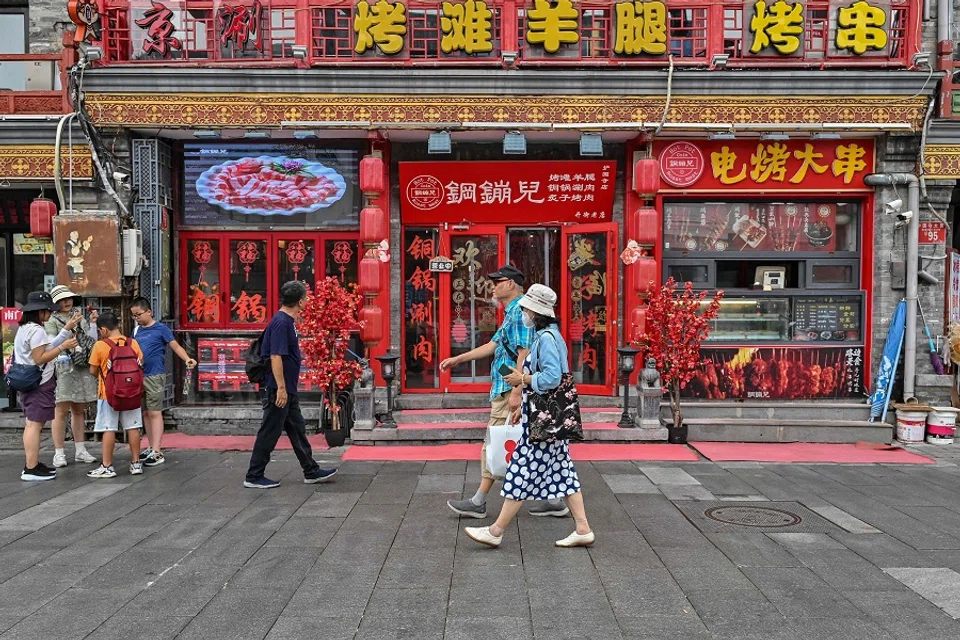Beijingers spurn eating out amid sluggish economy
Large Chinese cities such as Beijing and Shanghai, home to many high-income groups, have long been hubs for high-end dining and luxury retail. However, salary cuts in the financial sector, layoffs in major tech companies and a sluggish real estate market are now slowing income growth and decreasing consumers’ appetite to spend.

(By Caixin journalist Zhang Yukun)
Beijing’s major food and beverage (F&B) companies saw their combined profits slump almost 90% year-on-year in the first half of the year, government data show, underscoring the weak state of consumption in China’s big cities amid the country’s patchy post-Covid recovery.
In the January-to-June period, their total profits nosedived 88.8% year-on-year to 180.3 million RMB (US$25.3 million), according to recently published data by the Beijing Municipal Bureau of Statistics covering firms whose F&B annual revenue is at least two million RMB.
The downturn in the first half was an improvement on the first quarter, however, when these F&B companies recorded a loss of 453.7 million RMB, compared with a profit of 655.5 million RMB for the same period in 2023.
The slump in profits in Beijing’s F&B sector came as the city’s retail sales data lagged behind the country as a whole.

A breakdown of the January-to-June data shows that profits earned through fast-food services amounted to 243.8 million RMB, while the formal dining-out sector reported a loss of 76.5 million RMB.
The slump in profits in Beijing’s F&B sector came as the city’s retail sales data lagged behind the country as a whole.
In the first half of 2024, China’s total retail sales of consumer goods increased 3.7% year-on-year, with those from the F&B sector growing 7.9%, data published by the National Bureau of Statistics showed. In the same period, Beijing’s total retail sales dipped 0.3%.
In Shanghai, another of China’s largest cities, total retail sales of consumer goods in the first six months dropped 2.3% compared with the same period last year.
... salary cuts in the financial sector, layoffs in major tech companies and a sluggish real estate market have slowed income growth in these cities, leading to reduced spending power and a decline in consumer confidence.

Shanghai’s major hospitality service providers, including restaurants and hotels, with annual revenue of at least two million RMB from their core business suffered a combined operating loss of 770 million RMB in the first half, moving into the red after recording a profit of 1.7 billion RMB in the same period last year, according to the city’s statistics bureau.
Large cities such as Beijing and Shanghai, home to many high-income groups, have become hubs for high-end dining and luxury retail. However, salary cuts in the financial sector, layoffs in major tech companies and a sluggish real estate market have slowed income growth in these cities, leading to reduced spending power and a decline in consumer confidence.
In the first half, the share of consumption in per capita disposable income for Beijing was 56.1%, down from 62.4% in the same period in 2019, according to Caixin calculations based on government data. The share for Shanghai dropped to 58.9% from the pre-pandemic level of 63.8%.
Yang Jing contributed to this story.
This article was first published by Caixin Global as “Charts of the Day: Beijingers Spurn Eating Out Amid Sluggish Economy”. Caixin Global is one of the most respected sources for macroeconomic, financial and business news and information about China.



![[Photos] Fact versus fiction: The portrayal of WWII anti-Japanese martyrs in Taiwan](https://cassette.sphdigital.com.sg/image/thinkchina/3494f8bd481870f7c65b881fd21a3fd733f573f23232376e39c532a2c7593cbc)

